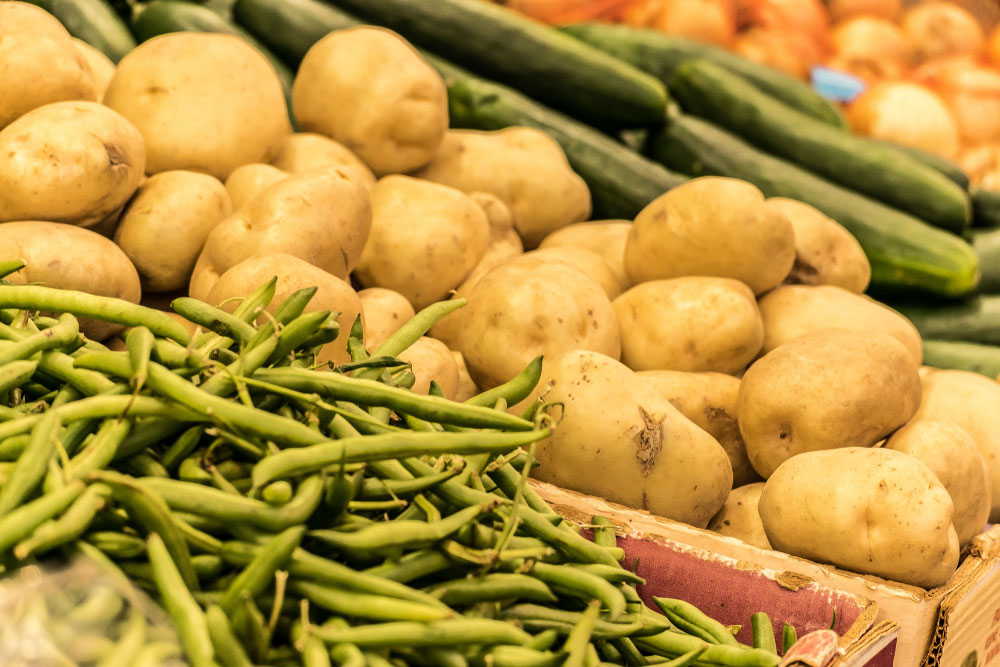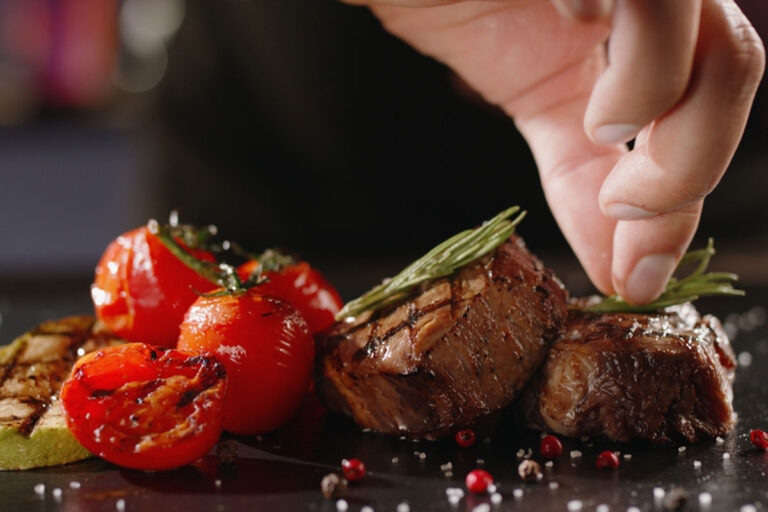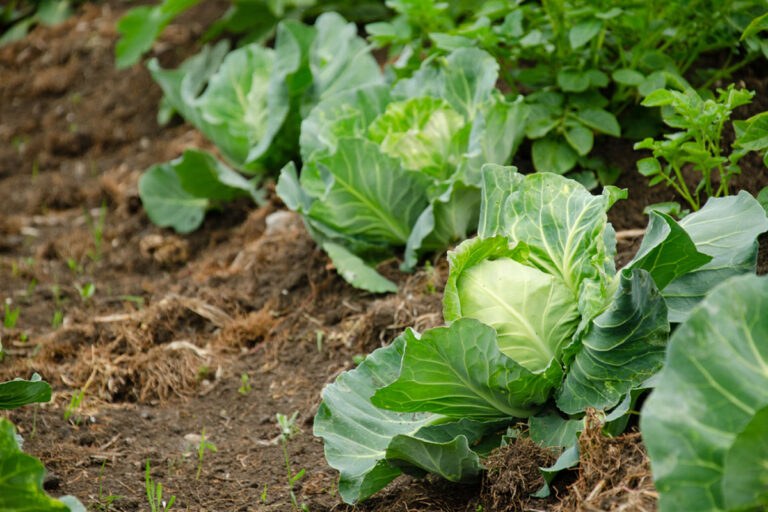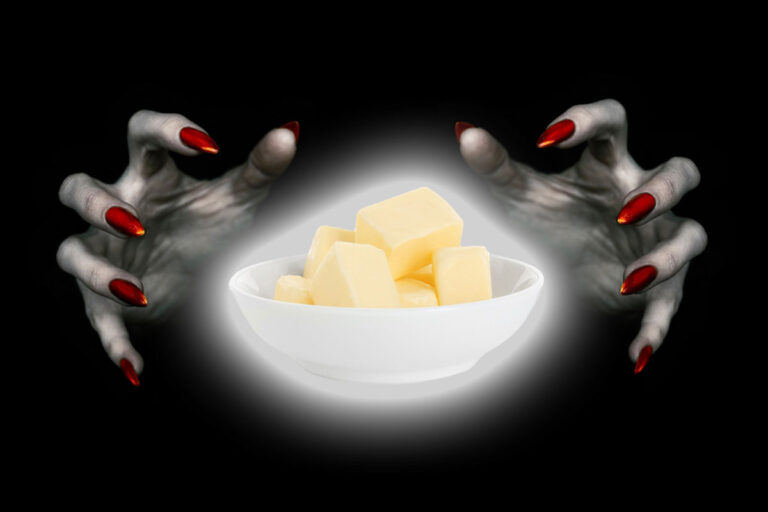Ireland, known for its breathtaking landscapes and vibrant culture, boasts a culinary heritage deeply rooted in tradition and hearty, meat-centric dishes. From the iconic Irish stew simmering with tender chunks of meat to the comforting aroma of corned beef and cabbage, Irish cuisine has long been synonymous with robust flavors derived from beef, lamb, and pork. This rich heritage often conjures images of meals meant to satisfy and fortify against the country’s often tempestuous weather.
However, beyond these renowned meat-based specialties lies a lesser-explored facet of Irish cooking—a treasure trove of vegetarian delights that reflect the country’s agrarian roots and a profound connection to the land. Contrary to popular perception, Irish cuisine offers an array of delicious and culturally significant vegetarian options that have sustained generations and embody the resourcefulness of a people deeply ingrained in farming and foraging practices.
The Irish vegetarian diet, often overshadowed by its meat-based counterparts, draws its essence from the bountiful harvests of the land. Rooted in a reverence for seasonal produce, it celebrates the humble yet versatile potato, the earthy sweetness of cabbage and kale, and the gentle piquancy of leeks and onions. These ingredients, woven into traditional recipes passed down through generations, form the cornerstone of a cuisine that resonates with simplicity, wholesomeness, and a celebration of nature’s bounty.
In this exploration of Irish cuisine, we venture beyond the well-known meaty classics to uncover a vibrant tapestry of vegetarian dishes. From comforting colcannon—mashed potatoes interlaced with tender cabbage—to the subtle elegance of champ, where scallions elevate simple mashed potatoes, each dish tells a story of sustenance, cultural heritage, and an enduring connection to the Irish landscape.
Join us on a journey through the flavors and traditions of the Irish vegetarian diet, as we delve into the historical roots, celebrate the culinary craftsmanship, and savor the diverse array of meat-free offerings that form an integral part of Ireland’s culinary identity.
Historical Perspective
Irish food history is a tapestry woven with threads of tradition, resilience, and a profound connection to the land. Throughout centuries, the Irish diet has been shaped not only by necessity but also by a deep cultural reverence for the bounty of the earth. While the imagery of meat-centric dishes often dominates the narrative, vegetarianism, in various forms, has been an intrinsic part of Irish culinary heritage for generations.
The historical roots of Irish vegetarianism trace back to an era where agrarian practices dictated the rhythm of life. In rural communities, where self-sufficiency was paramount, diets relied heavily on what the land provided. This dependence on agriculture fostered a cuisine centered around the harvest—where vegetables, grains, and dairy formed the cornerstone of everyday meals. Potatoes, revered as the ‘hero crop’ due to their reliability and nutritional value, became synonymous with Irish sustenance.
Foraging, too, played a significant role in Irish gastronomy. Communities explored the wealth of wild greens, herbs, and mushrooms abundant in the countryside. Nettles, wild garlic, and seaweed found their way into traditional recipes, adding nuanced flavors and nutritional depth to vegetarian dishes.
Local produce held pride of place in Irish kitchens. The fertile soils and temperate climate yielded an abundance of fresh vegetables such as cabbage, kale, turnips, carrots, and leeks. These ingredients, harvested in their prime, formed the basis of many hearty and comforting vegetarian meals that sustained families through the seasons.
The rhythm of the agricultural calendar dictated the ebb and flow of the Irish diet. From the anticipation of the potato harvest to the abundance of summer greens and the preservation of autumn’s bounty, each season brought forth a unique array of ingredients celebrated in traditional recipes.
In essence, Irish vegetarian cuisine, deeply rooted in agrarian traditions and a reverence for local produce, reflects a harmonious relationship between the people and the land. It embodies a sustainable approach to eating, where reliance on the earth’s offerings formed the basis of nourishment and culinary creativity, showcasing a resourcefulness and connection that transcends generations.
Key Ingredients in Irish Vegetarian Cuisine
Vegetarian Irish cuisine is a celebration of simplicity and depth, where a handful of key ingredients, predominantly sourced from the rich Irish soil, form the backbone of traditional dishes. These ingredients, often abundant and deeply ingrained in Irish culinary heritage, offer a tapestry of flavors that define the essence of vegetarian cooking in the country.
Potatoes:
The potato, a vital element of Irish cuisine, reigns supreme in vegetarian dishes. Revered for its versatility, nutritional value, and historical significance, potatoes feature prominently in various forms. Whether boiled, mashed, roasted, or in the form of potato cakes or bread, this humble tuber embodies comfort and sustenance in dishes like colcannon, champ, and boxty, lending a creamy texture and earthy flavor to meals.
Cabbage, Kale, and Leeks:
Cabbage, often combined with other leafy greens like kale, stands tall among the vegetable stars in Irish vegetarian cooking. Whether finely shredded and incorporated into colcannon or simmered alongside potatoes and carrots in a comforting stew, cabbage adds a sweet yet earthy note to dishes. Leeks, with their delicate onion-like flavor, elevate simple mashed potatoes in champ and provide depth to soups and stews.
Seasonal Vegetables:
The seasonal bounty of vegetables plays a pivotal role in Irish vegetarian dishes. Carrots, turnips, parsnips, and root vegetables harvested in their prime find their way into stews, soups, and savory pies, imparting sweetness and texture to these hearty meals. The celebration of seasonal produce reflects a connection to the land and a reverence for nature’s offerings.
Dairy Products:
Dairy products, notably butter and cheese, hold a revered place in Irish vegetarian cuisine. Rich, creamy butter from grass-fed cows is a fundamental flavor enhancer in many dishes. Whether melting over a steaming bowl of colcannon or generously slathered on freshly baked soda bread, butter infuses a comforting richness. Irish cheeses, such as mature cheddar or tangy farmhouse varieties, add depth and complexity to dishes, often grated over savory pies or incorporated into hearty gratins.
Herbs and Seasonings:
While the core ingredients form the backbone, Irish vegetarian cuisine derives its nuanced flavors from herbs like thyme, parsley, and dill, enhancing the natural flavors of vegetables. Simple seasoning with salt and pepper allows the purity of the ingredients to shine through.
In essence, the key ingredients in Irish vegetarian cuisine—a harmonious blend of potatoes, cabbage, leeks, seasonal vegetables, and dairy products—form the canvas upon which culinary traditions are painted. Their availability, versatility, and cultural significance embody the essence of a cuisine deeply rooted in the land and its offerings.
Traditional Vegetarian Irish Recipes
Irish vegetarian cuisine embodies a tapestry of dishes that celebrate the simplicity, wholesomeness, and rich flavors derived from humble ingredients. These time-honored recipes, passed down through generations, offer a glimpse into Ireland’s culinary heritage, each dish carrying historical and cultural significance.
Colcannon:
Colcannon, a beloved Irish comfort food, weaves together creamy mashed potatoes with tender cabbage (or kale), often infused with the subtle pungency of scallions or leeks. Beyond its role as a hearty side, colcannon carries deep cultural roots, traditionally served during Halloween with hidden charms predicting one’s future. Its simple yet flavorsome combination embodies the essence of Irish cuisine—a celebration of the land’s produce and a nod to the country’s agricultural traditions. (View Our Delicious Colcannon Recipe)
Champ:
Champ, akin to colcannon but with a focus on the delicate flavors of scallions or green onions, mingles with buttery mashed potatoes, creating a dish that exudes warmth and comfort. Its historical ties hark back to rural Ireland, where ingredients readily available from the farm were transformed into nourishing meals that sustained families through generations. (Try Our Traditional Recipe For Champ)
Boxty:
Boxty, a rustic potato pancake, harmonizes grated raw potatoes, mashed potatoes, flour, and buttermilk into a dish that’s both hearty and versatile. Fried until golden and crispy, boxty showcases the resourcefulness of the Irish, utilizing staple ingredients to create a satisfying meal that transcends social divides. (Our Favorite Boxty Recipe)
Irish Potato Soup:
This humble yet soul-warming soup, crafted from potatoes, onions, leeks, and often enhanced with a touch of cream or butter, represents a reflection of Irish resilience and practicality. It speaks to a time when sustenance was drawn from the earth, transforming humble vegetables into a nourishing elixir that warmed both body and soul. (Our Hearty Irish Potato Soup Recipe)
Nettle Soup:
Foraged greens like nettles find their place in traditional Irish cuisine, often in the form of nettle soup. Infused with the earthy flavors of wild greens, this soup embodies the resourceful nature of the Irish people, who turned to nature’s bounty for nourishment, showcasing an age-old practice of foraging deeply ingrained in the culture. (Try Our Tasty Nettle Soup)
Each of these traditional vegetarian Irish recipes not only tantalizes the taste buds but also serves as a cultural touchstone—a connection to Ireland’s agrarian past, a testament to the resourcefulness of its people, and a celebration of the inherent flavors found in simple, locally sourced ingredients.
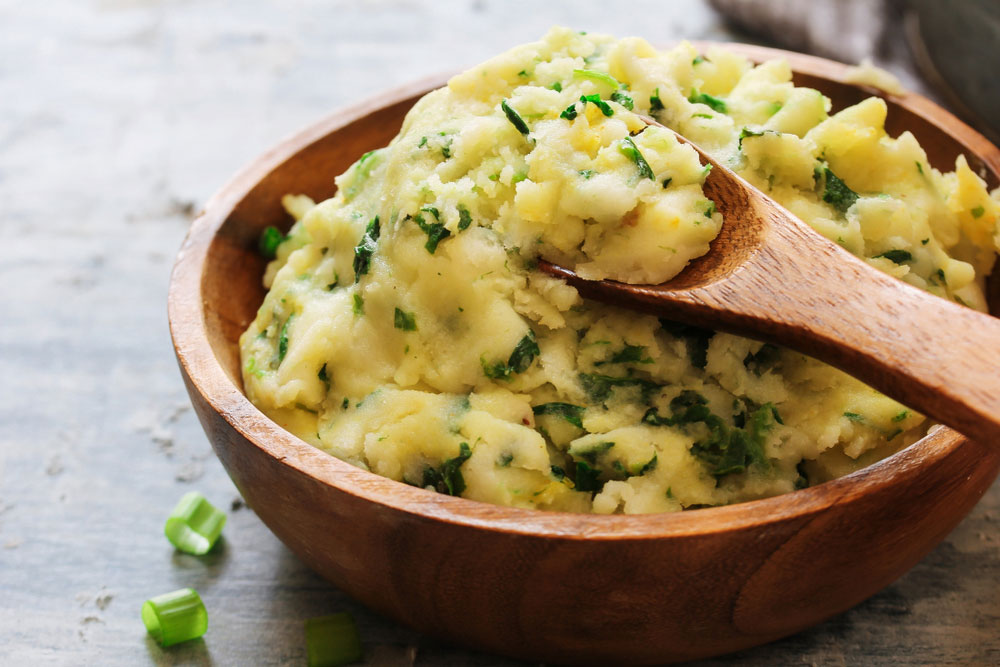
Adaptations and Modern Influences
Irish vegetarian cuisine, deeply rooted in tradition, has evolved over time, embracing modern cooking techniques, global influences, and innovative approaches that celebrate the marriage of heritage and contemporary tastes. This evolution reflects a dynamic culinary landscape that continues to redefine the boundaries of traditional Irish dishes.
Modern Cooking Techniques:
With advancements in culinary practices, traditional Irish vegetarian recipes have undergone transformations through modern cooking techniques. Chefs and home cooks alike experiment with methods such as sous-vide cooking, molecular gastronomy, and precision cooking to elevate the flavors and textures of classic dishes while staying true to their essence. For instance, colcannon may be reinvented as elegantly piped potato puree, adorned with crispy kale chips for added texture and visual appeal.
International Influences:
The globalization of food has opened doors to a plethora of ingredients and flavors, influencing contemporary Irish vegetarian cuisine. Fusion dishes that merge Irish recipes with elements from various culinary traditions—such as Asian, Mediterranean, or Middle Eastern—have gained popularity. A colcannon-inspired sushi roll or a champ-inspired falafel wrap are examples of how traditional Irish flavors are reimagined in innovative, cross-cultural creations.
Innovative Approaches to Traditional Recipes:
Contemporary chefs and food enthusiasts continually explore inventive ways to reinterpret traditional Irish vegetarian dishes. They may introduce unconventional ingredients or adapt cooking methods to breathe new life into classic recipes. A boxty might incorporate unconventional fillings like spiced lentils or roasted vegetables, elevating this rustic pancake into a gourmet delight.
Use of Global Ingredients:
The availability of diverse ingredients from around the world has expanded the flavor palette of Irish vegetarian cuisine. Chefs and cooks experiment with global ingredients—such as exotic spices, specialty cheeses, or heirloom vegetables—to create vegetarian versions of iconic Irish meals. These ingredients, while not native to Ireland, add depth and complexity to traditional recipes, offering a contemporary twist.
Ethical and Health Considerations:
The modern landscape of vegetarian cuisine in Ireland also reflects evolving attitudes toward health and sustainability. More people are embracing vegetarianism for ethical, environmental, and health reasons, leading to an increased demand for plant-based options. Restaurants and food establishments respond by offering innovative vegetarian menus that cater to a growing audience seeking healthier and more sustainable food choices.
The evolution of Irish vegetarian cuisine embraces a fusion of tradition and innovation, where respect for heritage meets the excitement of culinary experimentation. Through the infusion of modern techniques, international influences, and a global pantry of ingredients, traditional Irish vegetarian dishes continue to adapt and thrive in a dynamic culinary landscape.
Health Benefits and Nutritional Aspects
Traditional Irish vegetarian dishes, rooted in simple, plant-based ingredients, offer a wealth of nutritional benefits that contribute to overall health and well-being. Emphasizing vegetables, whole grains, and plant-based proteins, these dishes provide a diverse array of essential nutrients while promoting a balanced diet.
Abundance of Nutrient-Rich Ingredients:
Vegetarian Irish cuisine relies heavily on vegetables, particularly potatoes, cabbage, kale, leeks, and root vegetables, each offering a spectrum of vitamins, minerals, and antioxidants. Potatoes, a staple in many dishes, are an excellent source of vitamin C, potassium, and fiber, while cabbage and kale provide essential vitamins K, C, and folate.
Fiber and Digestive Health:
The fiber content found abundantly in vegetarian Irish dishes supports digestive health and aids in maintaining a healthy gut microbiome. The combination of vegetables, grains, and legumes promotes regularity, assists in maintaining healthy cholesterol levels, and helps in controlling blood sugar levels.
Rich in Essential Vitamins and Minerals:
Vegetarian dishes like colcannon, champ, and various soups boast a diverse array of vitamins and minerals. For instance, leeks and onions present in these dishes contain antioxidants and compounds known for their potential immune-boosting properties, while also contributing to bone health and cardiovascular wellness.
Balanced Macronutrients:
When combined thoughtfully, traditional Irish vegetarian recipes often provide a balance of macronutrients. Potatoes offer carbohydrates for energy, while dairy products like butter and cheese provide essential fats and proteins. Incorporating a variety of vegetables ensures a diverse intake of nutrients essential for vitality.
Potential Benefits of a Balanced Vegetarian Diet:
A well-planned vegetarian diet, like the one reflected in traditional Irish cuisine, may offer numerous health benefits. Studies suggest that a balanced vegetarian diet can reduce the risk of certain chronic diseases, including heart disease, hypertension, type 2 diabetes, and certain cancers. It may also contribute to weight management and promote longevity when combined with an active lifestyle.
Promotion of Sustainability and Environmental Health:
Beyond individual health, a shift towards plant-based diets, such as the vegetarian offerings in Irish cuisine, promotes sustainability by reducing the environmental impact associated with meat production. Choosing plant-based options supports conservation of natural resources and mitigates the ecological footprint.
In summary, traditional Irish vegetarian dishes, rich in vegetables and plant-based ingredients, offer a myriad of health benefits. When part of a well-rounded diet, these dishes contribute to overall wellness, providing essential nutrients, promoting digestive health, and potentially reducing the risk of chronic diseases. Embracing a balanced vegetarian diet not only nurtures personal health but also aligns with sustainable practices that benefit both individuals and the planet.
Conclusion
The Irish vegetarian diet, a tapestry woven with historical roots and culinary traditions, presents a vibrant array of flavors and textures that embody the essence of Ireland’s relationship with the land and its offerings. From its humble beginnings rooted in agrarian practices to its evolution embracing modern tastes, this cuisine is a testament to resilience, resourcefulness, and an enduring connection to nature.
Historical Roots and Traditional Recipes:
Steeped in history, the Irish vegetarian diet finds its essence in the simplicity and wholesomeness of traditional recipes passed down through generations. Colcannon, champ, boxty, and an array of soups and stews reflect a time when sustenance was drawn from the earth, celebrating the bounty of vegetables, potatoes, and dairy products that defined Irish kitchens.
Evolution and Adaptation:
Yet, Irish vegetarian cuisine is not confined to the pages of history. It has evolved, embracing modern influences and innovative approaches without losing touch with its heritage. The fusion of international flavors, the use of global ingredients, and the adoption of contemporary cooking techniques have breathed new life into classic dishes, making them relevant to modern tastes and preferences.
Celebrating Diversity and Flavors:
The diversity of Irish vegetarian cuisine is a reflection of Ireland’s multifaceted culinary landscape. It encompasses a spectrum of flavors—earthy, comforting, and soul-nourishing—that tell stories of resilience, cultural heritage, and an unwavering bond with the land.
Encouragement to Explore and Appreciate:
As we bid adieu to this culinary journey through the Irish vegetarian diet, we encourage you to delve deeper into this rich tapestry of flavors. Explore the bustling markets, savor the comforting warmth of a traditional Irish soup, and savor the innovative interpretations that pay homage to tradition while embracing modernity.
Through the exploration and appreciation of Irish vegetarian cuisine, one discovers not just a spectrum of flavors but also a deeper understanding of a culture intertwined with its food. Each dish holds within it a piece of history, a taste of tradition, and an invitation to appreciate the simplicity and richness of a cuisine that celebrates the beauty of vegetables and the artistry of culinary craftsmanship.
As we celebrate the evolution and time-honored traditions, let the flavors of Irish vegetarian cuisine transport you to a place where the past meets the present, where simplicity meets innovation, and where every bite tells a story of a nation’s enduring love affair with its land.
Sláinte agus táinte! (Health and wealth!)




